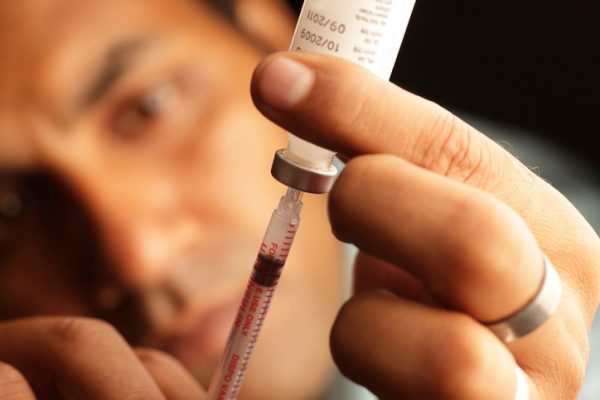
Amid reports of skyrocketing prices for insulin forcing Type 1 diabetes patients into the potentially deadly practice of rationing the drug and the resulting negative publicity, the maker of one of the most popular insulin brands is introducing a cheaper version of its own product.
Indianapolis-based Eli Lilly & Co. said Monday it would begin selling a version of Humalog (insulin lispro injection) in the US, priced 50 percent lower than the currently Humalog list price. Sold simply as insulin lispro, minus the brand name, the new version will be available in the form of a single vial at a list price of $137.35 or a pack of five injection pens for $265.20.
The list price of a vial of Humalog was $274.70 as of 2017, according to Business Insider. However, the lower-priced version is still much more expensive than the approximately $20 that Humalog cost when it was introduced in 1996 – about $32 today, adjusted for inflation. Humalog’s compound and formulation patents expired in 2013 and 2014, respectively. Humalog is Lilly’s second top-selling drug and had nearly $3 billion in sales in 2018, according to Lilly financial reports.
According to a poll last year by the diabetes advocacy organization Beyond Type 1, nearly 30 percent of 500 respondents said they rationed insulin because they couldn’t afford it, while another 6 percent said they switched to over-the-counter insulin, which is cheaper but less effective. Rationing insulin can lead to diabetic ketoacidosis, a potentially fatal condition.
Insulin is but one component of the broader national conversation taking place about drug pricing. Last week, seven pharmaceutical industry CEOs faced grilling by the Senate Finance Committee. Among them was Olivier Brandicourt, CEO of French drugmaker Sanofi, which markets a number of insulin products, including Lantus (insulin glargine) and a long-acting formulation, Toujeo SoloStar, which won FDA approval last year.
Rebates that drugmakers pay to pharmacy benefit managers were a particular area of focus, and reforms to the rebate system have been proposed by the Department of Health and Human Services. The CEOs testifying last week expressed support for reform.

A Deep-dive Into Specialty Pharma
A specialty drug is a class of prescription medications used to treat complex, chronic or rare medical conditions. Although this classification was originally intended to define the treatment of rare, also termed “orphan” diseases, affecting fewer than 200,000 people in the US, more recently, specialty drugs have emerged as the cornerstone of treatment for chronic and complex diseases such as cancer, autoimmune conditions, diabetes, hepatitis C, and HIV/AIDS.
“The significant rebates we pay on insulins do not directly benefit all patients,” Lilly CEO David Ricks said in a statement Monday. “There are numerous ideas, including the rebate reform proposal from HHS. For people with diabetes, a lower-priced insulin can serve as a bridge that addresses gaps in the system until a more sustainable model is achieved.”
The HHS proposal would exclude the rebates to PBMs, Medicare Part D programs and Medicaid managed care organizations from safe-harbor protection under the Anti-Kickback statute.
Photo: eromaze, Getty Images













